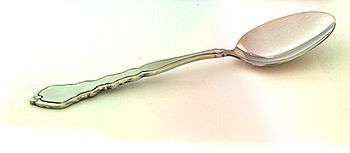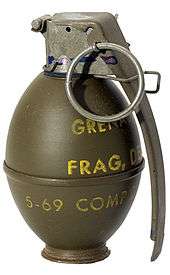Definify.com
Webster 1913 Edition
Spoon
Spoon
(spoōn)
, Verb.
I.
(Naut.)
See
Spoom
. [Obs.]
We might have
spooned
before the wind as well as they. Pepys.
Spoon
,Noun.
[OE.
spon
, AS. spōn
, a chip; akin to D. spaan
, G. span
, Dan. spaan
, Sw. spån
, Icel. spánn
, spónn
, a chip, a spoon. √170. Cf. Span-new
.] 1.
An implement consisting of a small bowl (usually a shallow oval) with a handle, used especially in preparing or eating food.
“Therefore behoveth him a full long
That shall eat with a fiend,” thus heard I say.
spoon
That shall eat with a fiend,” thus heard I say.
Chaucer.
He must have a long
spoon
that must eat with the devil. Shakespeare
2.
Anything which resembles a spoon in shape; esp.
(Fishing)
, a spoon bait. 3.
Fig.: A simpleton; a spooney.
[Slang]
Hood.
Spoon bait
(Fishing)
, a lure used in trolling, consisting of a glistening metallic plate shaped like the bowl of a spoon with a fishhook attached.
– Spoon bit
, a bit for boring, hollowed or furrowed along one side.
– Spoon net
, a net for landing fish.
– Spoon oar
. See under
Oar
.Spoon
,Verb.
T.
1.
To take up in, or as in, a spoon.
Spoon
,Verb.
I.
To act with demonstrative or foolish fondness, as one in love.
[Colloq.]
Webster 1828 Edition
Spoon
SPOON
,Noun.
1.
A small domestic utensil, with a bowl or concave part and a handle, for dipping liquids; as a tea spoon; a table spoon.2.
An instrument consisting of a bowl or hollow iron and a long handle, used for taking earth out of holes dug for setting posts.SPOON
,Verb.
I.
Definition 2026
Spoon
spoon
spoon
See also: Spoon
English

A table spoon

A fishing spoon

A hand grenade with spoon (lever) at right
Noun
spoon (plural spoons)
- An implement for eating or serving; a scooped utensil whose long handle is straight, in contrast to a ladle.
- Shakespeare
- He must have a long spoon that must eat with the devil.
- Shakespeare
- An implement for stirring food while being prepared; a wooden spoon.
- A measure that will fit into a spoon; a spoonful.
- (sports, archaic) A wooden-headed golf club with moderate loft, similar to the modern three wood.
- (fishing) A type of metal lure resembling the concave head of a table spoon.
- (dentistry, informal) A spoon excavator.
- (figuratively, slang, archaic) A simpleton, a spooney.
- (Can we find and add a quotation of Hood to this entry?)
- (US, military) A safety handle on a hand grenade, a trigger.
Derived terms
Terms derived from spoon (noun)
|
|
Translations
scooped utensil for eating (or serving)
|
|
measure that will fit into a spoon — see spoonful
metal lure for fishing
Verb
spoon (third-person singular simple present spoons, present participle spooning, simple past and past participle spooned)
- To serve using a spoon.
- Sarah spooned some apple sauce onto her plate.
- (intransitive, dated) To flirt; to make advances; to court, to interact romantically or amorously.
- 1913, D.H. Lawrence, Sons and Lovers, chapter 7
- Do you think we spoon and do? We only talk.
- 1913, D.H. Lawrence, Sons and Lovers, chapter 7
- (transitive or intransitive, slang, of persons) To lie nestled front-to-back, following the contours of the bodies, in a manner reminiscent of stacked spoons.
- (tennis, golf, croquet) To hit (the ball) weakly, pushing it with a lifting motion, instead of striking with an audible knock.
- 2012 June 28, Jamie Jackson, “Wimbledon 2012: Lukas Rosol shocked by miracle win over Rafael Nadal”, in the Guardian:
- Rosol spurned the chance to finish off a shallow second serve by spooning into the net, and a wild forehand took the set to 5-4, with the native of Prerov required to hold his serve for victory.
-
- (intransitive) To fish with a concave spoon bait.
- (transitive) To catch by fishing with a concave spoon bait.
- Mrs. Humphry Ward
- He had with him all the tackle necessary for spooning pike.
- Mrs. Humphry Ward
Derived terms
- spooner
- spoon-feed (v)
- spoon off (v)
- big spoon, little spoon
Translations
to serve using a spoon
to flirt
to lie together
See also
Etymology 2
Origin uncertain. Compare spoom.
Verb
spoon (third-person singular simple present spoons, present participle spooning, simple past and past participle spooned)
- Alternative form of spoom
- Samuel Pepys
- We might have spooned before the wind as well as they.
- Samuel Pepys
Derived terms
Translations
sailing terminology